Essay: UK and the Reduction of Poverty in Recent Years
VerifiedAdded on 2022/10/04
|11
|3304
|14
Essay
AI Summary
This essay examines the decline of poverty in the UK over the past 20 years, attributing it to increased affluence and government initiatives. It explores the role of employment opportunities, the impact of educational policies, and the effects of government interventions like the Jobseeker's Allowance. The essay highlights how the UK's economic environment, including the presence of multinational corporations and the influence of the European Union, has contributed to lower unemployment rates and improved living standards. Furthermore, it discusses the importance of vocational training and the government's efforts to address wealth inequality through various policies and corporate social responsibility initiatives. The essay concludes by emphasizing the multifaceted approach the UK has taken to reduce poverty and improve the quality of life for its citizens.
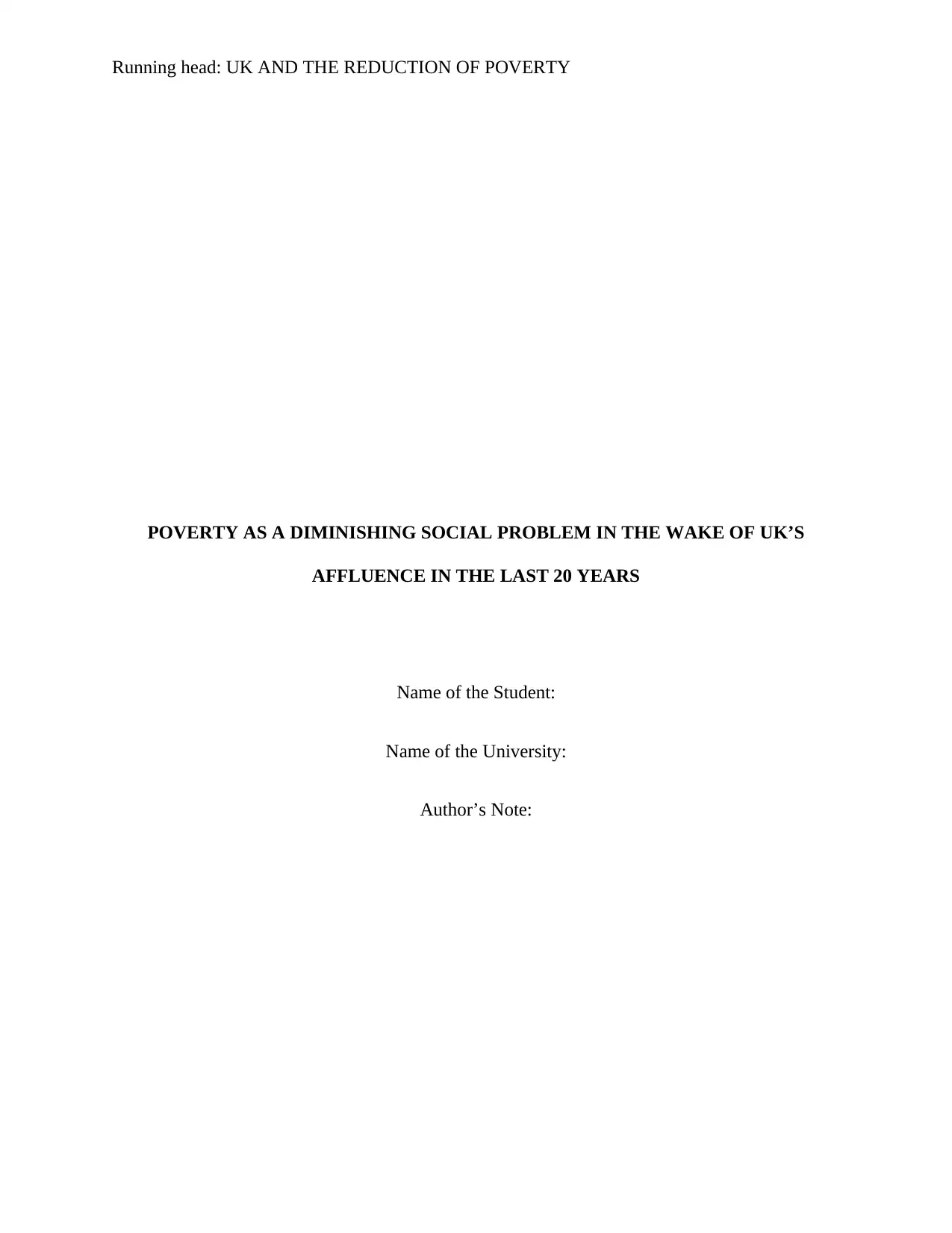
Running head: UK AND THE REDUCTION OF POVERTY
POVERTY AS A DIMINISHING SOCIAL PROBLEM IN THE WAKE OF UK’S
AFFLUENCE IN THE LAST 20 YEARS
Name of the Student:
Name of the University:
Author’s Note:
POVERTY AS A DIMINISHING SOCIAL PROBLEM IN THE WAKE OF UK’S
AFFLUENCE IN THE LAST 20 YEARS
Name of the Student:
Name of the University:
Author’s Note:
Paraphrase This Document
Need a fresh take? Get an instant paraphrase of this document with our AI Paraphraser
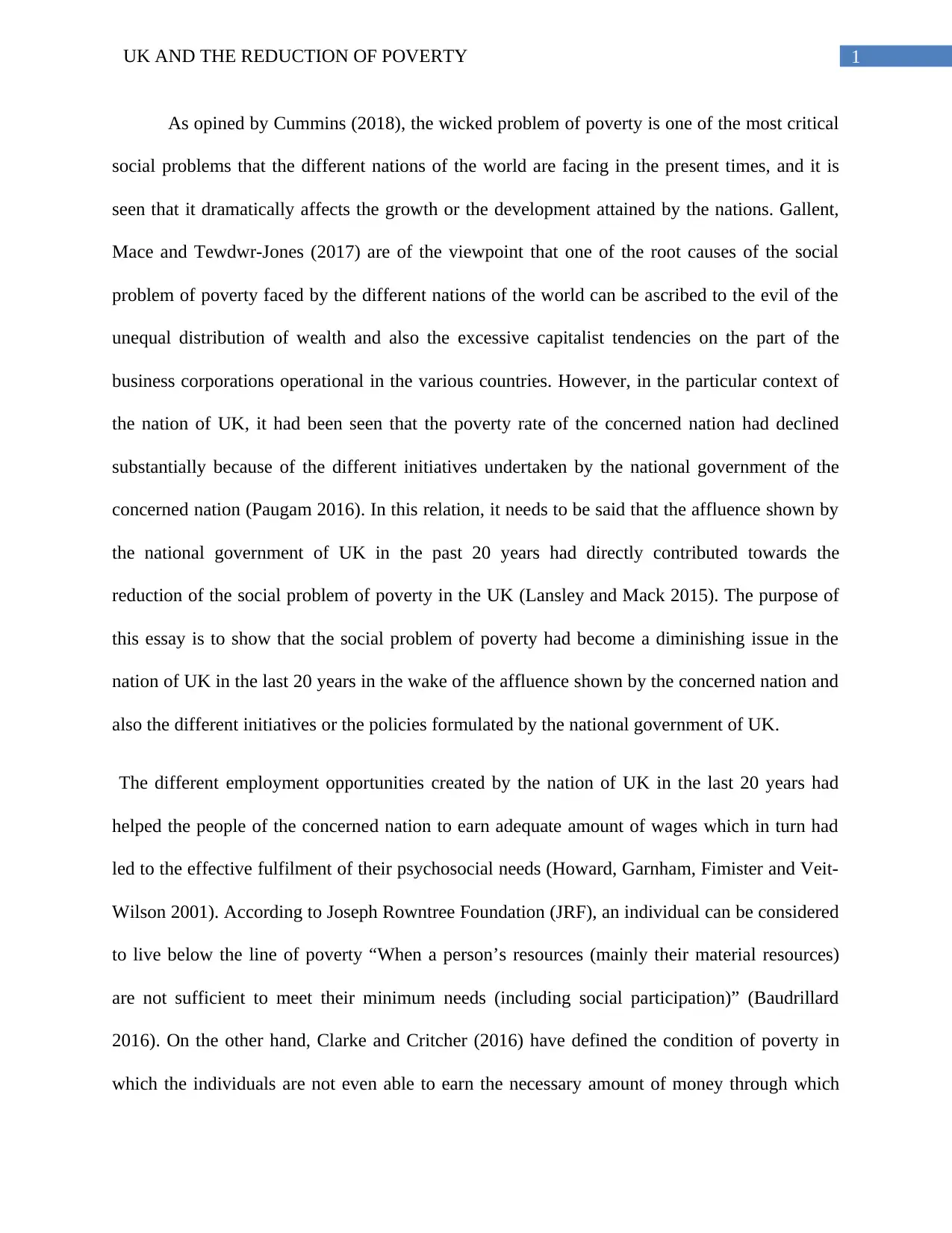
1UK AND THE REDUCTION OF POVERTY
As opined by Cummins (2018), the wicked problem of poverty is one of the most critical
social problems that the different nations of the world are facing in the present times, and it is
seen that it dramatically affects the growth or the development attained by the nations. Gallent,
Mace and Tewdwr-Jones (2017) are of the viewpoint that one of the root causes of the social
problem of poverty faced by the different nations of the world can be ascribed to the evil of the
unequal distribution of wealth and also the excessive capitalist tendencies on the part of the
business corporations operational in the various countries. However, in the particular context of
the nation of UK, it had been seen that the poverty rate of the concerned nation had declined
substantially because of the different initiatives undertaken by the national government of the
concerned nation (Paugam 2016). In this relation, it needs to be said that the affluence shown by
the national government of UK in the past 20 years had directly contributed towards the
reduction of the social problem of poverty in the UK (Lansley and Mack 2015). The purpose of
this essay is to show that the social problem of poverty had become a diminishing issue in the
nation of UK in the last 20 years in the wake of the affluence shown by the concerned nation and
also the different initiatives or the policies formulated by the national government of UK.
The different employment opportunities created by the nation of UK in the last 20 years had
helped the people of the concerned nation to earn adequate amount of wages which in turn had
led to the effective fulfilment of their psychosocial needs (Howard, Garnham, Fimister and Veit-
Wilson 2001). According to Joseph Rowntree Foundation (JRF), an individual can be considered
to live below the line of poverty “When a person’s resources (mainly their material resources)
are not sufficient to meet their minimum needs (including social participation)” (Baudrillard
2016). On the other hand, Clarke and Critcher (2016) have defined the condition of poverty in
which the individuals are not even able to earn the necessary amount of money through which
As opined by Cummins (2018), the wicked problem of poverty is one of the most critical
social problems that the different nations of the world are facing in the present times, and it is
seen that it dramatically affects the growth or the development attained by the nations. Gallent,
Mace and Tewdwr-Jones (2017) are of the viewpoint that one of the root causes of the social
problem of poverty faced by the different nations of the world can be ascribed to the evil of the
unequal distribution of wealth and also the excessive capitalist tendencies on the part of the
business corporations operational in the various countries. However, in the particular context of
the nation of UK, it had been seen that the poverty rate of the concerned nation had declined
substantially because of the different initiatives undertaken by the national government of the
concerned nation (Paugam 2016). In this relation, it needs to be said that the affluence shown by
the national government of UK in the past 20 years had directly contributed towards the
reduction of the social problem of poverty in the UK (Lansley and Mack 2015). The purpose of
this essay is to show that the social problem of poverty had become a diminishing issue in the
nation of UK in the last 20 years in the wake of the affluence shown by the concerned nation and
also the different initiatives or the policies formulated by the national government of UK.
The different employment opportunities created by the nation of UK in the last 20 years had
helped the people of the concerned nation to earn adequate amount of wages which in turn had
led to the effective fulfilment of their psychosocial needs (Howard, Garnham, Fimister and Veit-
Wilson 2001). According to Joseph Rowntree Foundation (JRF), an individual can be considered
to live below the line of poverty “When a person’s resources (mainly their material resources)
are not sufficient to meet their minimum needs (including social participation)” (Baudrillard
2016). On the other hand, Clarke and Critcher (2016) have defined the condition of poverty in
which the individuals are not even able to earn the necessary amount of money through which
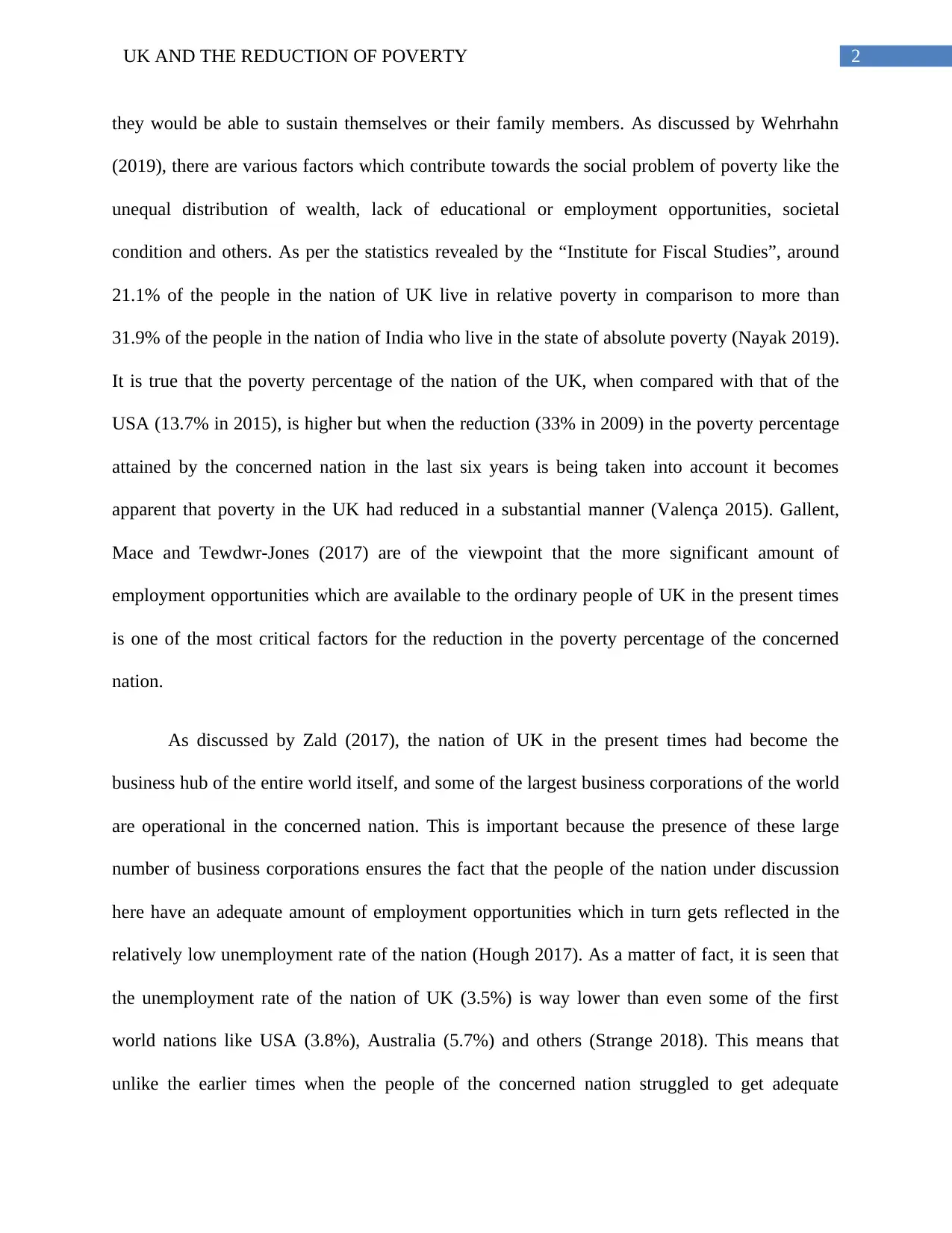
2UK AND THE REDUCTION OF POVERTY
they would be able to sustain themselves or their family members. As discussed by Wehrhahn
(2019), there are various factors which contribute towards the social problem of poverty like the
unequal distribution of wealth, lack of educational or employment opportunities, societal
condition and others. As per the statistics revealed by the “Institute for Fiscal Studies”, around
21.1% of the people in the nation of UK live in relative poverty in comparison to more than
31.9% of the people in the nation of India who live in the state of absolute poverty (Nayak 2019).
It is true that the poverty percentage of the nation of the UK, when compared with that of the
USA (13.7% in 2015), is higher but when the reduction (33% in 2009) in the poverty percentage
attained by the concerned nation in the last six years is being taken into account it becomes
apparent that poverty in the UK had reduced in a substantial manner (Valença 2015). Gallent,
Mace and Tewdwr-Jones (2017) are of the viewpoint that the more significant amount of
employment opportunities which are available to the ordinary people of UK in the present times
is one of the most critical factors for the reduction in the poverty percentage of the concerned
nation.
As discussed by Zald (2017), the nation of UK in the present times had become the
business hub of the entire world itself, and some of the largest business corporations of the world
are operational in the concerned nation. This is important because the presence of these large
number of business corporations ensures the fact that the people of the nation under discussion
here have an adequate amount of employment opportunities which in turn gets reflected in the
relatively low unemployment rate of the nation (Hough 2017). As a matter of fact, it is seen that
the unemployment rate of the nation of UK (3.5%) is way lower than even some of the first
world nations like USA (3.8%), Australia (5.7%) and others (Strange 2018). This means that
unlike the earlier times when the people of the concerned nation struggled to get adequate
they would be able to sustain themselves or their family members. As discussed by Wehrhahn
(2019), there are various factors which contribute towards the social problem of poverty like the
unequal distribution of wealth, lack of educational or employment opportunities, societal
condition and others. As per the statistics revealed by the “Institute for Fiscal Studies”, around
21.1% of the people in the nation of UK live in relative poverty in comparison to more than
31.9% of the people in the nation of India who live in the state of absolute poverty (Nayak 2019).
It is true that the poverty percentage of the nation of the UK, when compared with that of the
USA (13.7% in 2015), is higher but when the reduction (33% in 2009) in the poverty percentage
attained by the concerned nation in the last six years is being taken into account it becomes
apparent that poverty in the UK had reduced in a substantial manner (Valença 2015). Gallent,
Mace and Tewdwr-Jones (2017) are of the viewpoint that the more significant amount of
employment opportunities which are available to the ordinary people of UK in the present times
is one of the most critical factors for the reduction in the poverty percentage of the concerned
nation.
As discussed by Zald (2017), the nation of UK in the present times had become the
business hub of the entire world itself, and some of the largest business corporations of the world
are operational in the concerned nation. This is important because the presence of these large
number of business corporations ensures the fact that the people of the nation under discussion
here have an adequate amount of employment opportunities which in turn gets reflected in the
relatively low unemployment rate of the nation (Hough 2017). As a matter of fact, it is seen that
the unemployment rate of the nation of UK (3.5%) is way lower than even some of the first
world nations like USA (3.8%), Australia (5.7%) and others (Strange 2018). This means that
unlike the earlier times when the people of the concerned nation struggled to get adequate
⊘ This is a preview!⊘
Do you want full access?
Subscribe today to unlock all pages.

Trusted by 1+ million students worldwide
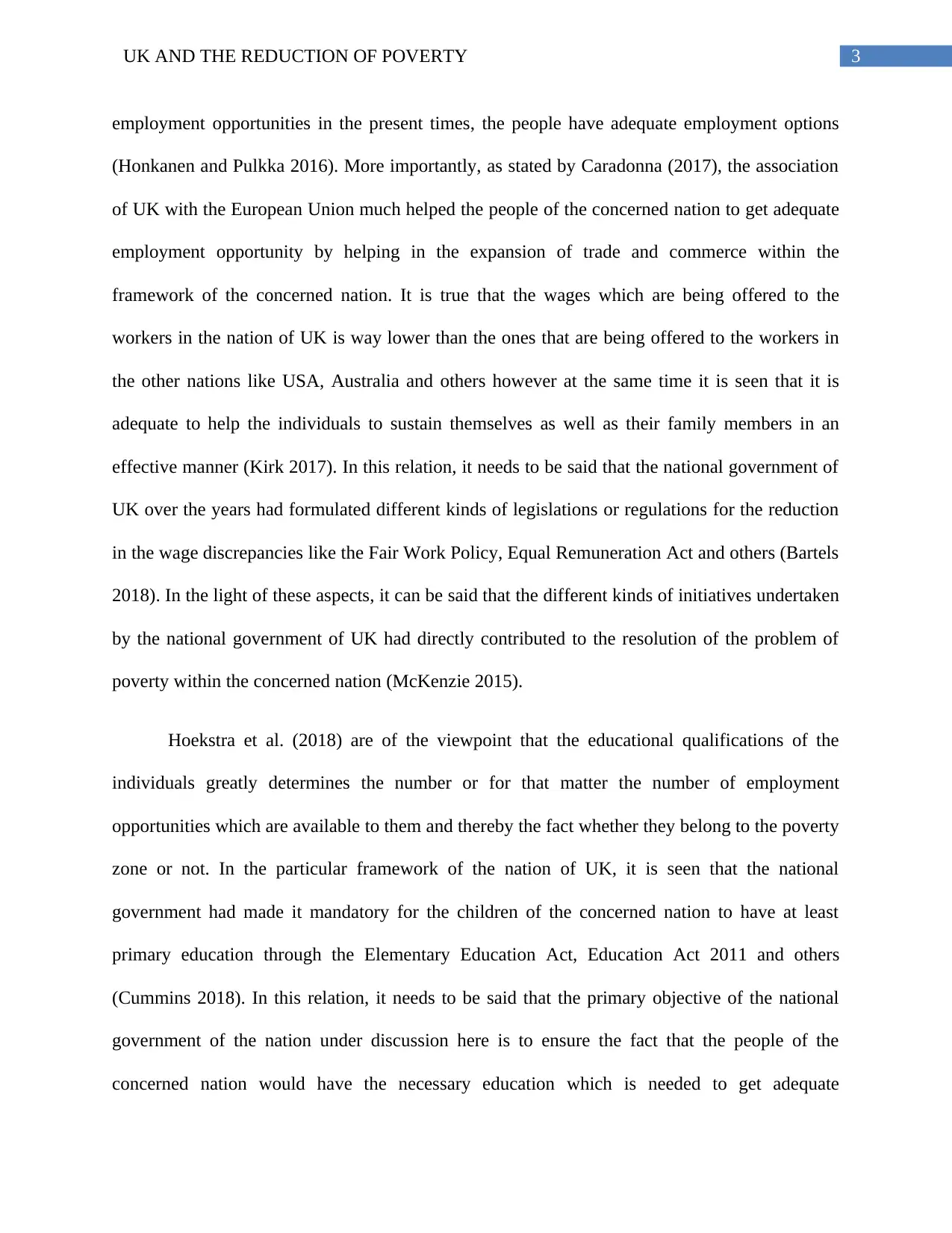
3UK AND THE REDUCTION OF POVERTY
employment opportunities in the present times, the people have adequate employment options
(Honkanen and Pulkka 2016). More importantly, as stated by Caradonna (2017), the association
of UK with the European Union much helped the people of the concerned nation to get adequate
employment opportunity by helping in the expansion of trade and commerce within the
framework of the concerned nation. It is true that the wages which are being offered to the
workers in the nation of UK is way lower than the ones that are being offered to the workers in
the other nations like USA, Australia and others however at the same time it is seen that it is
adequate to help the individuals to sustain themselves as well as their family members in an
effective manner (Kirk 2017). In this relation, it needs to be said that the national government of
UK over the years had formulated different kinds of legislations or regulations for the reduction
in the wage discrepancies like the Fair Work Policy, Equal Remuneration Act and others (Bartels
2018). In the light of these aspects, it can be said that the different kinds of initiatives undertaken
by the national government of UK had directly contributed to the resolution of the problem of
poverty within the concerned nation (McKenzie 2015).
Hoekstra et al. (2018) are of the viewpoint that the educational qualifications of the
individuals greatly determines the number or for that matter the number of employment
opportunities which are available to them and thereby the fact whether they belong to the poverty
zone or not. In the particular framework of the nation of UK, it is seen that the national
government had made it mandatory for the children of the concerned nation to have at least
primary education through the Elementary Education Act, Education Act 2011 and others
(Cummins 2018). In this relation, it needs to be said that the primary objective of the national
government of the nation under discussion here is to ensure the fact that the people of the
concerned nation would have the necessary education which is needed to get adequate
employment opportunities in the present times, the people have adequate employment options
(Honkanen and Pulkka 2016). More importantly, as stated by Caradonna (2017), the association
of UK with the European Union much helped the people of the concerned nation to get adequate
employment opportunity by helping in the expansion of trade and commerce within the
framework of the concerned nation. It is true that the wages which are being offered to the
workers in the nation of UK is way lower than the ones that are being offered to the workers in
the other nations like USA, Australia and others however at the same time it is seen that it is
adequate to help the individuals to sustain themselves as well as their family members in an
effective manner (Kirk 2017). In this relation, it needs to be said that the national government of
UK over the years had formulated different kinds of legislations or regulations for the reduction
in the wage discrepancies like the Fair Work Policy, Equal Remuneration Act and others (Bartels
2018). In the light of these aspects, it can be said that the different kinds of initiatives undertaken
by the national government of UK had directly contributed to the resolution of the problem of
poverty within the concerned nation (McKenzie 2015).
Hoekstra et al. (2018) are of the viewpoint that the educational qualifications of the
individuals greatly determines the number or for that matter the number of employment
opportunities which are available to them and thereby the fact whether they belong to the poverty
zone or not. In the particular framework of the nation of UK, it is seen that the national
government had made it mandatory for the children of the concerned nation to have at least
primary education through the Elementary Education Act, Education Act 2011 and others
(Cummins 2018). In this relation, it needs to be said that the primary objective of the national
government of the nation under discussion here is to ensure the fact that the people of the
concerned nation would have the necessary education which is needed to get adequate
Paraphrase This Document
Need a fresh take? Get an instant paraphrase of this document with our AI Paraphraser
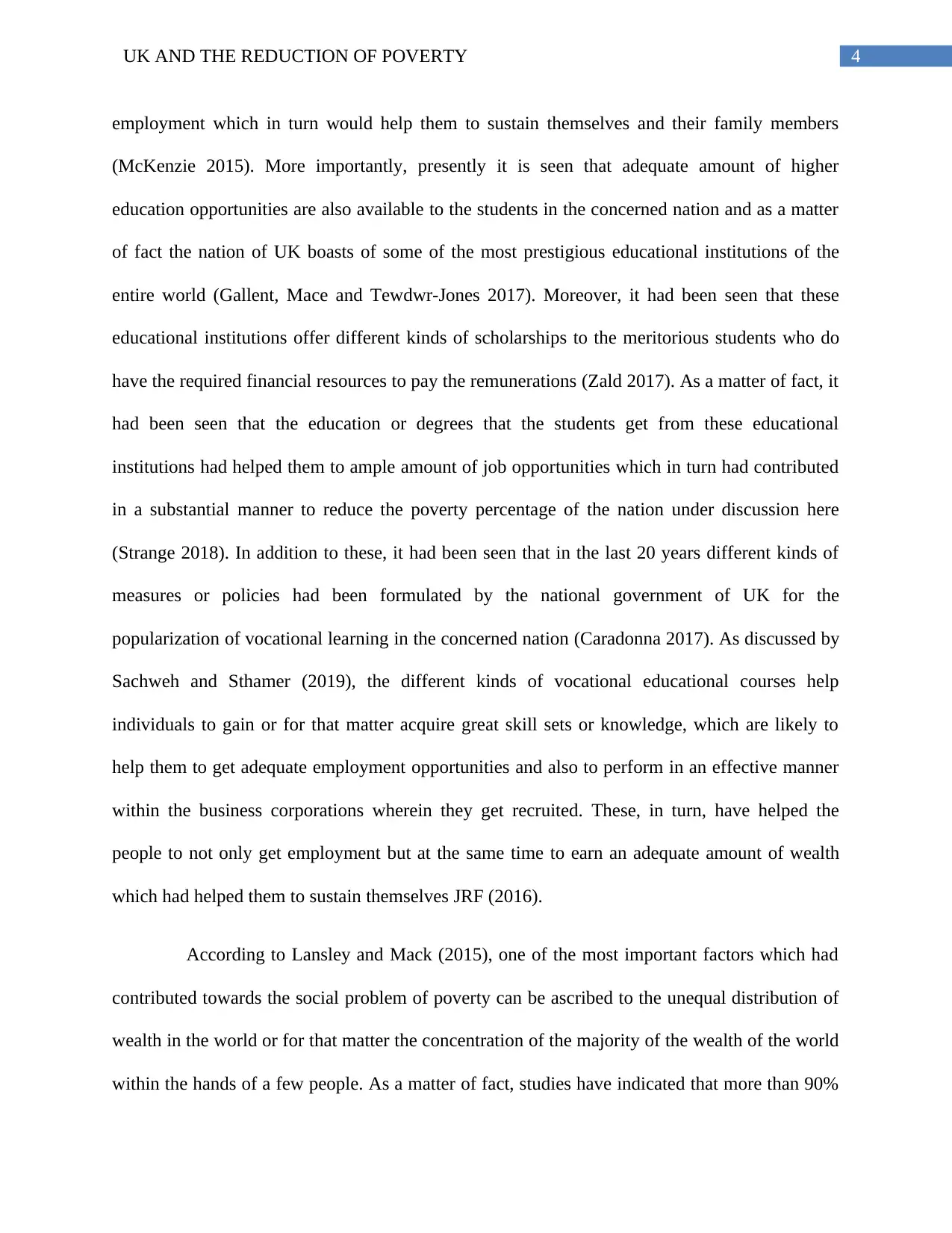
4UK AND THE REDUCTION OF POVERTY
employment which in turn would help them to sustain themselves and their family members
(McKenzie 2015). More importantly, presently it is seen that adequate amount of higher
education opportunities are also available to the students in the concerned nation and as a matter
of fact the nation of UK boasts of some of the most prestigious educational institutions of the
entire world (Gallent, Mace and Tewdwr-Jones 2017). Moreover, it had been seen that these
educational institutions offer different kinds of scholarships to the meritorious students who do
have the required financial resources to pay the remunerations (Zald 2017). As a matter of fact, it
had been seen that the education or degrees that the students get from these educational
institutions had helped them to ample amount of job opportunities which in turn had contributed
in a substantial manner to reduce the poverty percentage of the nation under discussion here
(Strange 2018). In addition to these, it had been seen that in the last 20 years different kinds of
measures or policies had been formulated by the national government of UK for the
popularization of vocational learning in the concerned nation (Caradonna 2017). As discussed by
Sachweh and Sthamer (2019), the different kinds of vocational educational courses help
individuals to gain or for that matter acquire great skill sets or knowledge, which are likely to
help them to get adequate employment opportunities and also to perform in an effective manner
within the business corporations wherein they get recruited. These, in turn, have helped the
people to not only get employment but at the same time to earn an adequate amount of wealth
which had helped them to sustain themselves JRF (2016).
According to Lansley and Mack (2015), one of the most important factors which had
contributed towards the social problem of poverty can be ascribed to the unequal distribution of
wealth in the world or for that matter the concentration of the majority of the wealth of the world
within the hands of a few people. As a matter of fact, studies have indicated that more than 90%
employment which in turn would help them to sustain themselves and their family members
(McKenzie 2015). More importantly, presently it is seen that adequate amount of higher
education opportunities are also available to the students in the concerned nation and as a matter
of fact the nation of UK boasts of some of the most prestigious educational institutions of the
entire world (Gallent, Mace and Tewdwr-Jones 2017). Moreover, it had been seen that these
educational institutions offer different kinds of scholarships to the meritorious students who do
have the required financial resources to pay the remunerations (Zald 2017). As a matter of fact, it
had been seen that the education or degrees that the students get from these educational
institutions had helped them to ample amount of job opportunities which in turn had contributed
in a substantial manner to reduce the poverty percentage of the nation under discussion here
(Strange 2018). In addition to these, it had been seen that in the last 20 years different kinds of
measures or policies had been formulated by the national government of UK for the
popularization of vocational learning in the concerned nation (Caradonna 2017). As discussed by
Sachweh and Sthamer (2019), the different kinds of vocational educational courses help
individuals to gain or for that matter acquire great skill sets or knowledge, which are likely to
help them to get adequate employment opportunities and also to perform in an effective manner
within the business corporations wherein they get recruited. These, in turn, have helped the
people to not only get employment but at the same time to earn an adequate amount of wealth
which had helped them to sustain themselves JRF (2016).
According to Lansley and Mack (2015), one of the most important factors which had
contributed towards the social problem of poverty can be ascribed to the unequal distribution of
wealth in the world or for that matter the concentration of the majority of the wealth of the world
within the hands of a few people. As a matter of fact, studies have indicated that more than 90%
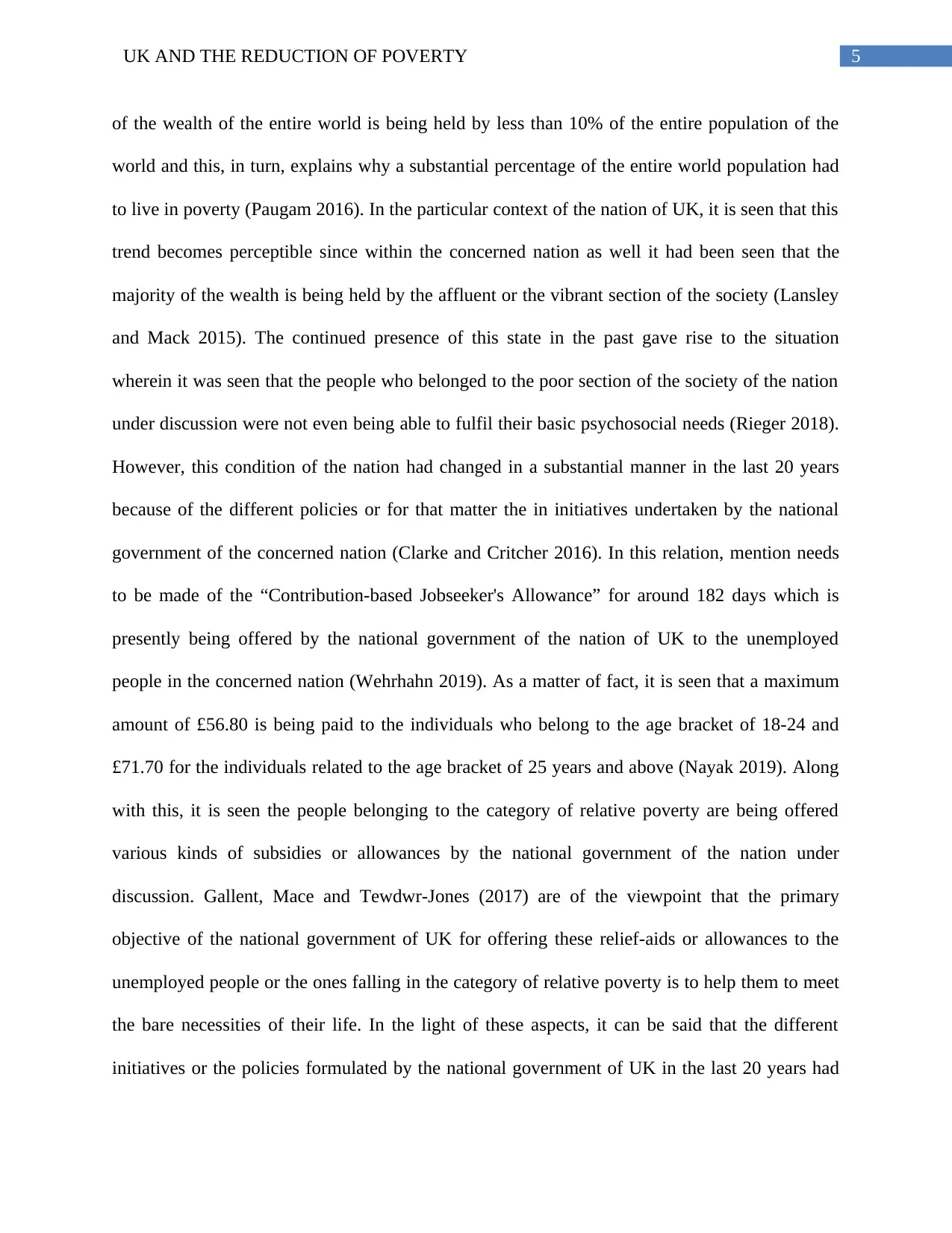
5UK AND THE REDUCTION OF POVERTY
of the wealth of the entire world is being held by less than 10% of the entire population of the
world and this, in turn, explains why a substantial percentage of the entire world population had
to live in poverty (Paugam 2016). In the particular context of the nation of UK, it is seen that this
trend becomes perceptible since within the concerned nation as well it had been seen that the
majority of the wealth is being held by the affluent or the vibrant section of the society (Lansley
and Mack 2015). The continued presence of this state in the past gave rise to the situation
wherein it was seen that the people who belonged to the poor section of the society of the nation
under discussion were not even being able to fulfil their basic psychosocial needs (Rieger 2018).
However, this condition of the nation had changed in a substantial manner in the last 20 years
because of the different policies or for that matter the in initiatives undertaken by the national
government of the concerned nation (Clarke and Critcher 2016). In this relation, mention needs
to be made of the “Contribution-based Jobseeker's Allowance” for around 182 days which is
presently being offered by the national government of the nation of UK to the unemployed
people in the concerned nation (Wehrhahn 2019). As a matter of fact, it is seen that a maximum
amount of £56.80 is being paid to the individuals who belong to the age bracket of 18-24 and
£71.70 for the individuals related to the age bracket of 25 years and above (Nayak 2019). Along
with this, it is seen the people belonging to the category of relative poverty are being offered
various kinds of subsidies or allowances by the national government of the nation under
discussion. Gallent, Mace and Tewdwr-Jones (2017) are of the viewpoint that the primary
objective of the national government of UK for offering these relief-aids or allowances to the
unemployed people or the ones falling in the category of relative poverty is to help them to meet
the bare necessities of their life. In the light of these aspects, it can be said that the different
initiatives or the policies formulated by the national government of UK in the last 20 years had
of the wealth of the entire world is being held by less than 10% of the entire population of the
world and this, in turn, explains why a substantial percentage of the entire world population had
to live in poverty (Paugam 2016). In the particular context of the nation of UK, it is seen that this
trend becomes perceptible since within the concerned nation as well it had been seen that the
majority of the wealth is being held by the affluent or the vibrant section of the society (Lansley
and Mack 2015). The continued presence of this state in the past gave rise to the situation
wherein it was seen that the people who belonged to the poor section of the society of the nation
under discussion were not even being able to fulfil their basic psychosocial needs (Rieger 2018).
However, this condition of the nation had changed in a substantial manner in the last 20 years
because of the different policies or for that matter the in initiatives undertaken by the national
government of the concerned nation (Clarke and Critcher 2016). In this relation, mention needs
to be made of the “Contribution-based Jobseeker's Allowance” for around 182 days which is
presently being offered by the national government of the nation of UK to the unemployed
people in the concerned nation (Wehrhahn 2019). As a matter of fact, it is seen that a maximum
amount of £56.80 is being paid to the individuals who belong to the age bracket of 18-24 and
£71.70 for the individuals related to the age bracket of 25 years and above (Nayak 2019). Along
with this, it is seen the people belonging to the category of relative poverty are being offered
various kinds of subsidies or allowances by the national government of the nation under
discussion. Gallent, Mace and Tewdwr-Jones (2017) are of the viewpoint that the primary
objective of the national government of UK for offering these relief-aids or allowances to the
unemployed people or the ones falling in the category of relative poverty is to help them to meet
the bare necessities of their life. In the light of these aspects, it can be said that the different
initiatives or the policies formulated by the national government of UK in the last 20 years had
⊘ This is a preview!⊘
Do you want full access?
Subscribe today to unlock all pages.

Trusted by 1+ million students worldwide
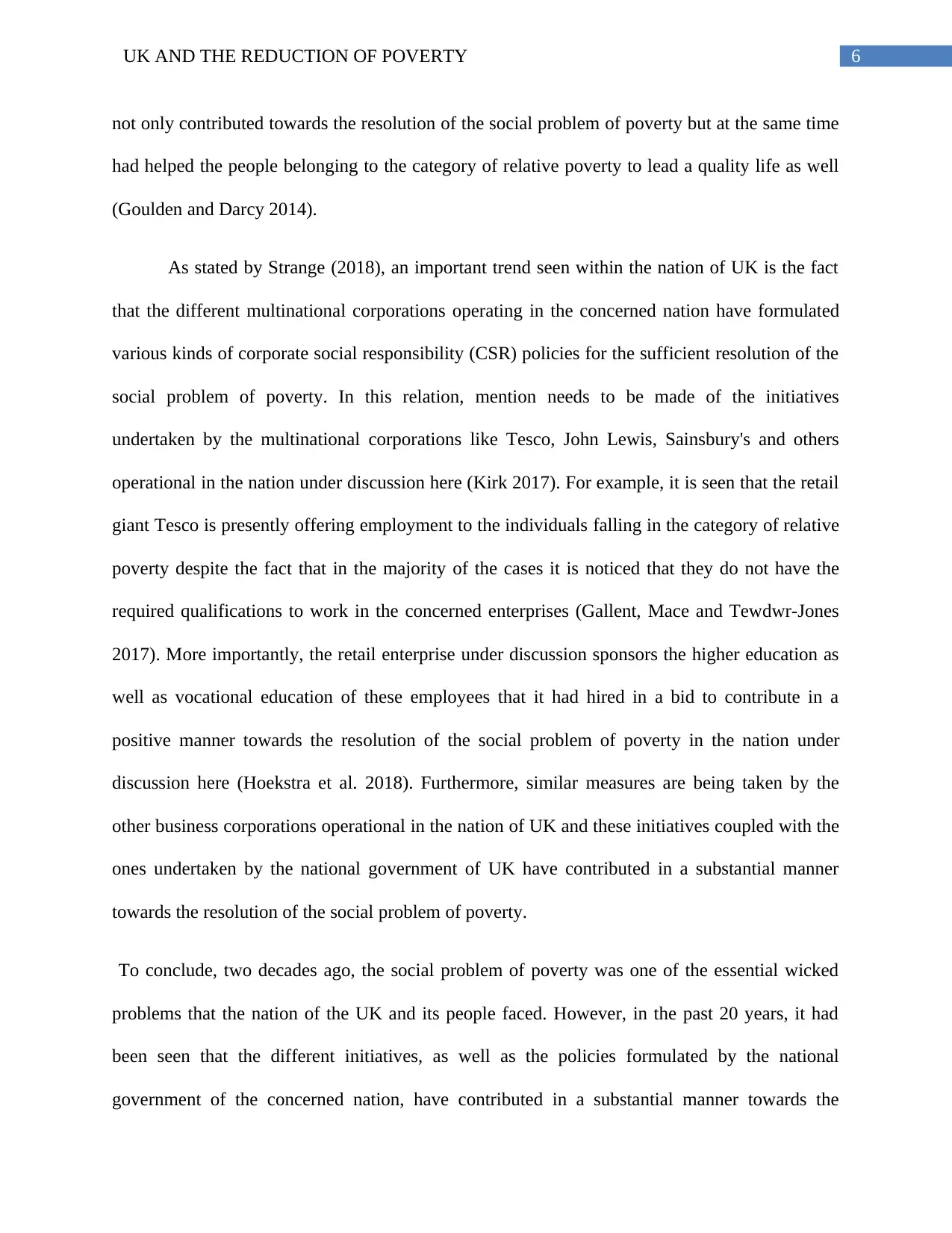
6UK AND THE REDUCTION OF POVERTY
not only contributed towards the resolution of the social problem of poverty but at the same time
had helped the people belonging to the category of relative poverty to lead a quality life as well
(Goulden and Darcy 2014).
As stated by Strange (2018), an important trend seen within the nation of UK is the fact
that the different multinational corporations operating in the concerned nation have formulated
various kinds of corporate social responsibility (CSR) policies for the sufficient resolution of the
social problem of poverty. In this relation, mention needs to be made of the initiatives
undertaken by the multinational corporations like Tesco, John Lewis, Sainsbury's and others
operational in the nation under discussion here (Kirk 2017). For example, it is seen that the retail
giant Tesco is presently offering employment to the individuals falling in the category of relative
poverty despite the fact that in the majority of the cases it is noticed that they do not have the
required qualifications to work in the concerned enterprises (Gallent, Mace and Tewdwr-Jones
2017). More importantly, the retail enterprise under discussion sponsors the higher education as
well as vocational education of these employees that it had hired in a bid to contribute in a
positive manner towards the resolution of the social problem of poverty in the nation under
discussion here (Hoekstra et al. 2018). Furthermore, similar measures are being taken by the
other business corporations operational in the nation of UK and these initiatives coupled with the
ones undertaken by the national government of UK have contributed in a substantial manner
towards the resolution of the social problem of poverty.
To conclude, two decades ago, the social problem of poverty was one of the essential wicked
problems that the nation of the UK and its people faced. However, in the past 20 years, it had
been seen that the different initiatives, as well as the policies formulated by the national
government of the concerned nation, have contributed in a substantial manner towards the
not only contributed towards the resolution of the social problem of poverty but at the same time
had helped the people belonging to the category of relative poverty to lead a quality life as well
(Goulden and Darcy 2014).
As stated by Strange (2018), an important trend seen within the nation of UK is the fact
that the different multinational corporations operating in the concerned nation have formulated
various kinds of corporate social responsibility (CSR) policies for the sufficient resolution of the
social problem of poverty. In this relation, mention needs to be made of the initiatives
undertaken by the multinational corporations like Tesco, John Lewis, Sainsbury's and others
operational in the nation under discussion here (Kirk 2017). For example, it is seen that the retail
giant Tesco is presently offering employment to the individuals falling in the category of relative
poverty despite the fact that in the majority of the cases it is noticed that they do not have the
required qualifications to work in the concerned enterprises (Gallent, Mace and Tewdwr-Jones
2017). More importantly, the retail enterprise under discussion sponsors the higher education as
well as vocational education of these employees that it had hired in a bid to contribute in a
positive manner towards the resolution of the social problem of poverty in the nation under
discussion here (Hoekstra et al. 2018). Furthermore, similar measures are being taken by the
other business corporations operational in the nation of UK and these initiatives coupled with the
ones undertaken by the national government of UK have contributed in a substantial manner
towards the resolution of the social problem of poverty.
To conclude, two decades ago, the social problem of poverty was one of the essential wicked
problems that the nation of the UK and its people faced. However, in the past 20 years, it had
been seen that the different initiatives, as well as the policies formulated by the national
government of the concerned nation, have contributed in a substantial manner towards the
Paraphrase This Document
Need a fresh take? Get an instant paraphrase of this document with our AI Paraphraser
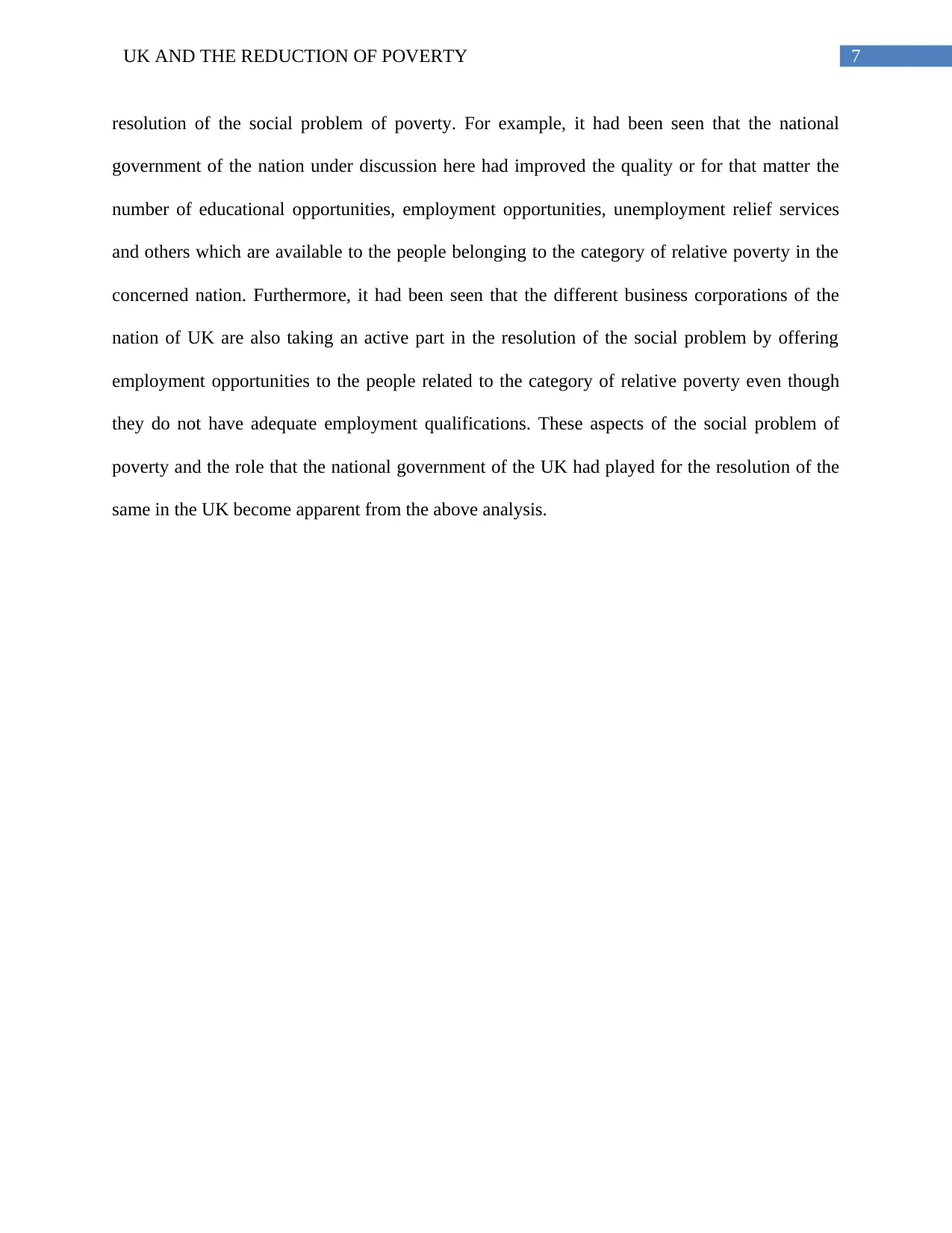
7UK AND THE REDUCTION OF POVERTY
resolution of the social problem of poverty. For example, it had been seen that the national
government of the nation under discussion here had improved the quality or for that matter the
number of educational opportunities, employment opportunities, unemployment relief services
and others which are available to the people belonging to the category of relative poverty in the
concerned nation. Furthermore, it had been seen that the different business corporations of the
nation of UK are also taking an active part in the resolution of the social problem by offering
employment opportunities to the people related to the category of relative poverty even though
they do not have adequate employment qualifications. These aspects of the social problem of
poverty and the role that the national government of the UK had played for the resolution of the
same in the UK become apparent from the above analysis.
resolution of the social problem of poverty. For example, it had been seen that the national
government of the nation under discussion here had improved the quality or for that matter the
number of educational opportunities, employment opportunities, unemployment relief services
and others which are available to the people belonging to the category of relative poverty in the
concerned nation. Furthermore, it had been seen that the different business corporations of the
nation of UK are also taking an active part in the resolution of the social problem by offering
employment opportunities to the people related to the category of relative poverty even though
they do not have adequate employment qualifications. These aspects of the social problem of
poverty and the role that the national government of the UK had played for the resolution of the
same in the UK become apparent from the above analysis.
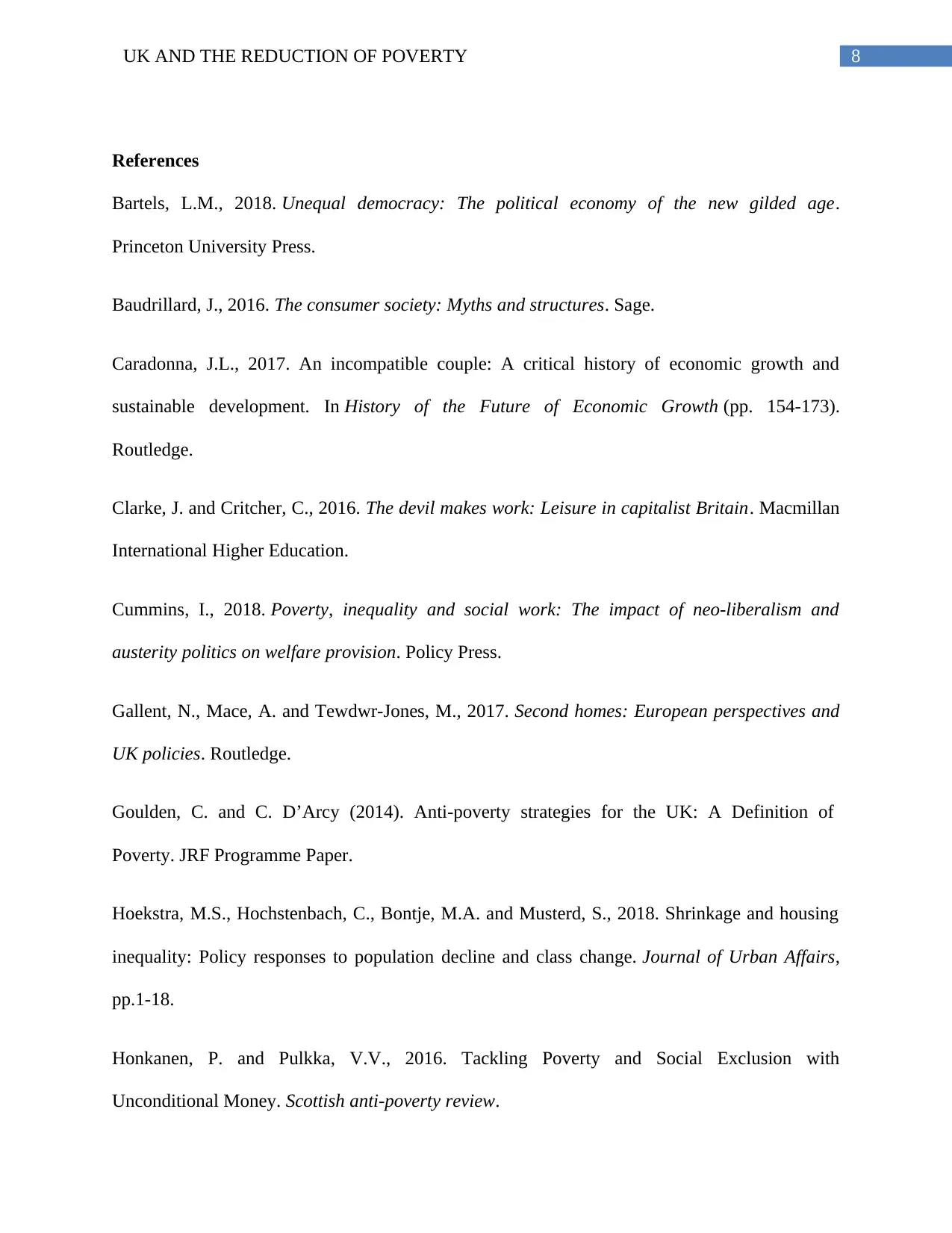
8UK AND THE REDUCTION OF POVERTY
References
Bartels, L.M., 2018. Unequal democracy: The political economy of the new gilded age.
Princeton University Press.
Baudrillard, J., 2016. The consumer society: Myths and structures. Sage.
Caradonna, J.L., 2017. An incompatible couple: A critical history of economic growth and
sustainable development. In History of the Future of Economic Growth (pp. 154-173).
Routledge.
Clarke, J. and Critcher, C., 2016. The devil makes work: Leisure in capitalist Britain. Macmillan
International Higher Education.
Cummins, I., 2018. Poverty, inequality and social work: The impact of neo-liberalism and
austerity politics on welfare provision. Policy Press.
Gallent, N., Mace, A. and Tewdwr-Jones, M., 2017. Second homes: European perspectives and
UK policies. Routledge.
Goulden, C. and C. D’Arcy (2014). Anti-poverty strategies for the UK: A Definition of
Poverty. JRF Programme Paper.
Hoekstra, M.S., Hochstenbach, C., Bontje, M.A. and Musterd, S., 2018. Shrinkage and housing
inequality: Policy responses to population decline and class change. Journal of Urban Affairs,
pp.1-18.
Honkanen, P. and Pulkka, V.V., 2016. Tackling Poverty and Social Exclusion with
Unconditional Money. Scottish anti-poverty review.
References
Bartels, L.M., 2018. Unequal democracy: The political economy of the new gilded age.
Princeton University Press.
Baudrillard, J., 2016. The consumer society: Myths and structures. Sage.
Caradonna, J.L., 2017. An incompatible couple: A critical history of economic growth and
sustainable development. In History of the Future of Economic Growth (pp. 154-173).
Routledge.
Clarke, J. and Critcher, C., 2016. The devil makes work: Leisure in capitalist Britain. Macmillan
International Higher Education.
Cummins, I., 2018. Poverty, inequality and social work: The impact of neo-liberalism and
austerity politics on welfare provision. Policy Press.
Gallent, N., Mace, A. and Tewdwr-Jones, M., 2017. Second homes: European perspectives and
UK policies. Routledge.
Goulden, C. and C. D’Arcy (2014). Anti-poverty strategies for the UK: A Definition of
Poverty. JRF Programme Paper.
Hoekstra, M.S., Hochstenbach, C., Bontje, M.A. and Musterd, S., 2018. Shrinkage and housing
inequality: Policy responses to population decline and class change. Journal of Urban Affairs,
pp.1-18.
Honkanen, P. and Pulkka, V.V., 2016. Tackling Poverty and Social Exclusion with
Unconditional Money. Scottish anti-poverty review.
⊘ This is a preview!⊘
Do you want full access?
Subscribe today to unlock all pages.

Trusted by 1+ million students worldwide
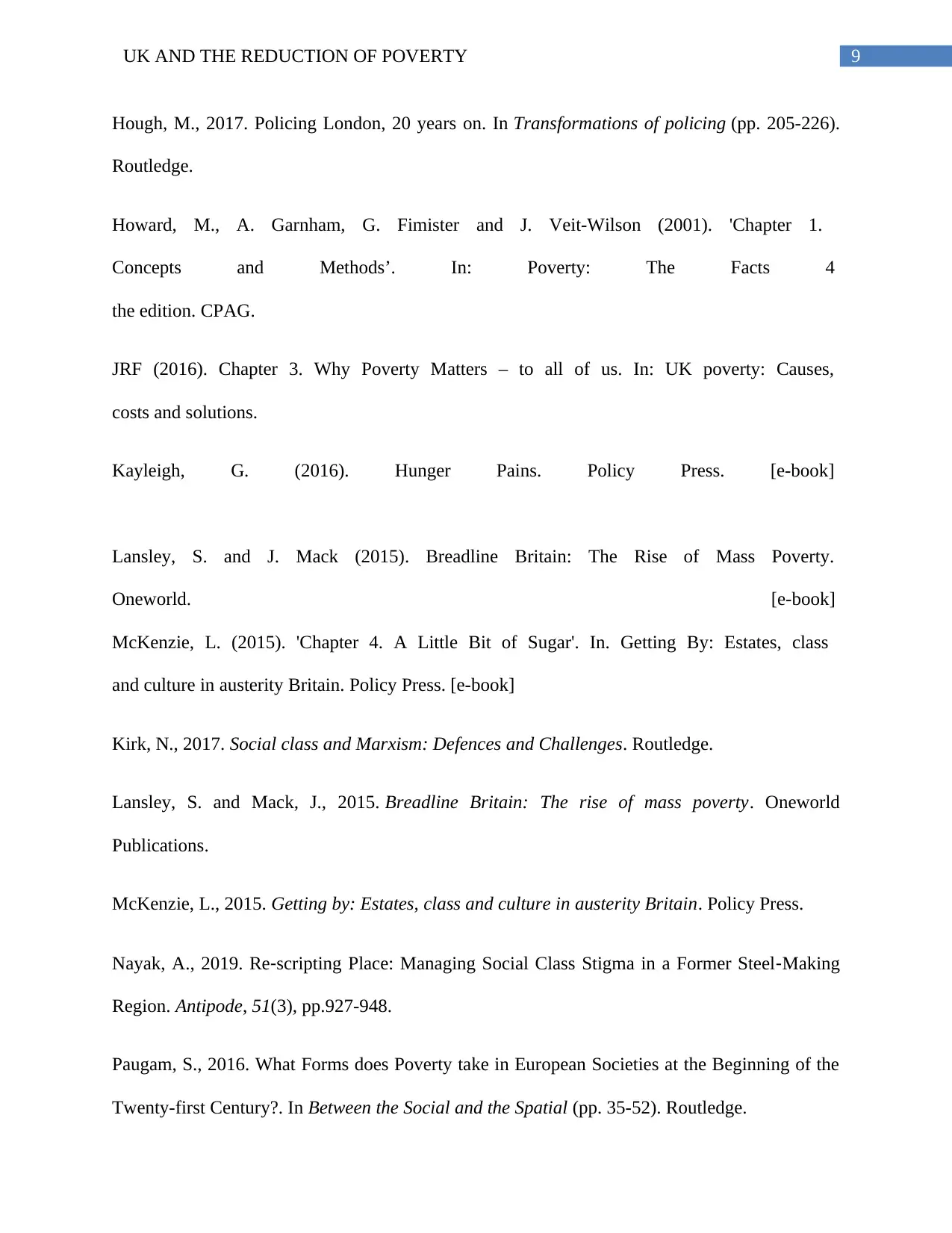
9UK AND THE REDUCTION OF POVERTY
Hough, M., 2017. Policing London, 20 years on. In Transformations of policing (pp. 205-226).
Routledge.
Howard, M., A. Garnham, G. Fimister and J. Veit-Wilson (2001). 'Chapter 1.
Concepts and Methods’. In: Poverty: The Facts 4
the edition. CPAG.
JRF (2016). Chapter 3. Why Poverty Matters – to all of us. In: UK poverty: Causes,
costs and solutions.
Kayleigh, G. (2016). Hunger Pains. Policy Press. [e-book]
Lansley, S. and J. Mack (2015). Breadline Britain: The Rise of Mass Poverty.
Oneworld. [e-book]
McKenzie, L. (2015). 'Chapter 4. A Little Bit of Sugar'. In. Getting By: Estates, class
and culture in austerity Britain. Policy Press. [e-book]
Kirk, N., 2017. Social class and Marxism: Defences and Challenges. Routledge.
Lansley, S. and Mack, J., 2015. Breadline Britain: The rise of mass poverty. Oneworld
Publications.
McKenzie, L., 2015. Getting by: Estates, class and culture in austerity Britain. Policy Press.
Nayak, A., 2019. Re‐scripting Place: Managing Social Class Stigma in a Former Steel‐Making
Region. Antipode, 51(3), pp.927-948.
Paugam, S., 2016. What Forms does Poverty take in European Societies at the Beginning of the
Twenty-first Century?. In Between the Social and the Spatial (pp. 35-52). Routledge.
Hough, M., 2017. Policing London, 20 years on. In Transformations of policing (pp. 205-226).
Routledge.
Howard, M., A. Garnham, G. Fimister and J. Veit-Wilson (2001). 'Chapter 1.
Concepts and Methods’. In: Poverty: The Facts 4
the edition. CPAG.
JRF (2016). Chapter 3. Why Poverty Matters – to all of us. In: UK poverty: Causes,
costs and solutions.
Kayleigh, G. (2016). Hunger Pains. Policy Press. [e-book]
Lansley, S. and J. Mack (2015). Breadline Britain: The Rise of Mass Poverty.
Oneworld. [e-book]
McKenzie, L. (2015). 'Chapter 4. A Little Bit of Sugar'. In. Getting By: Estates, class
and culture in austerity Britain. Policy Press. [e-book]
Kirk, N., 2017. Social class and Marxism: Defences and Challenges. Routledge.
Lansley, S. and Mack, J., 2015. Breadline Britain: The rise of mass poverty. Oneworld
Publications.
McKenzie, L., 2015. Getting by: Estates, class and culture in austerity Britain. Policy Press.
Nayak, A., 2019. Re‐scripting Place: Managing Social Class Stigma in a Former Steel‐Making
Region. Antipode, 51(3), pp.927-948.
Paugam, S., 2016. What Forms does Poverty take in European Societies at the Beginning of the
Twenty-first Century?. In Between the Social and the Spatial (pp. 35-52). Routledge.
Paraphrase This Document
Need a fresh take? Get an instant paraphrase of this document with our AI Paraphraser
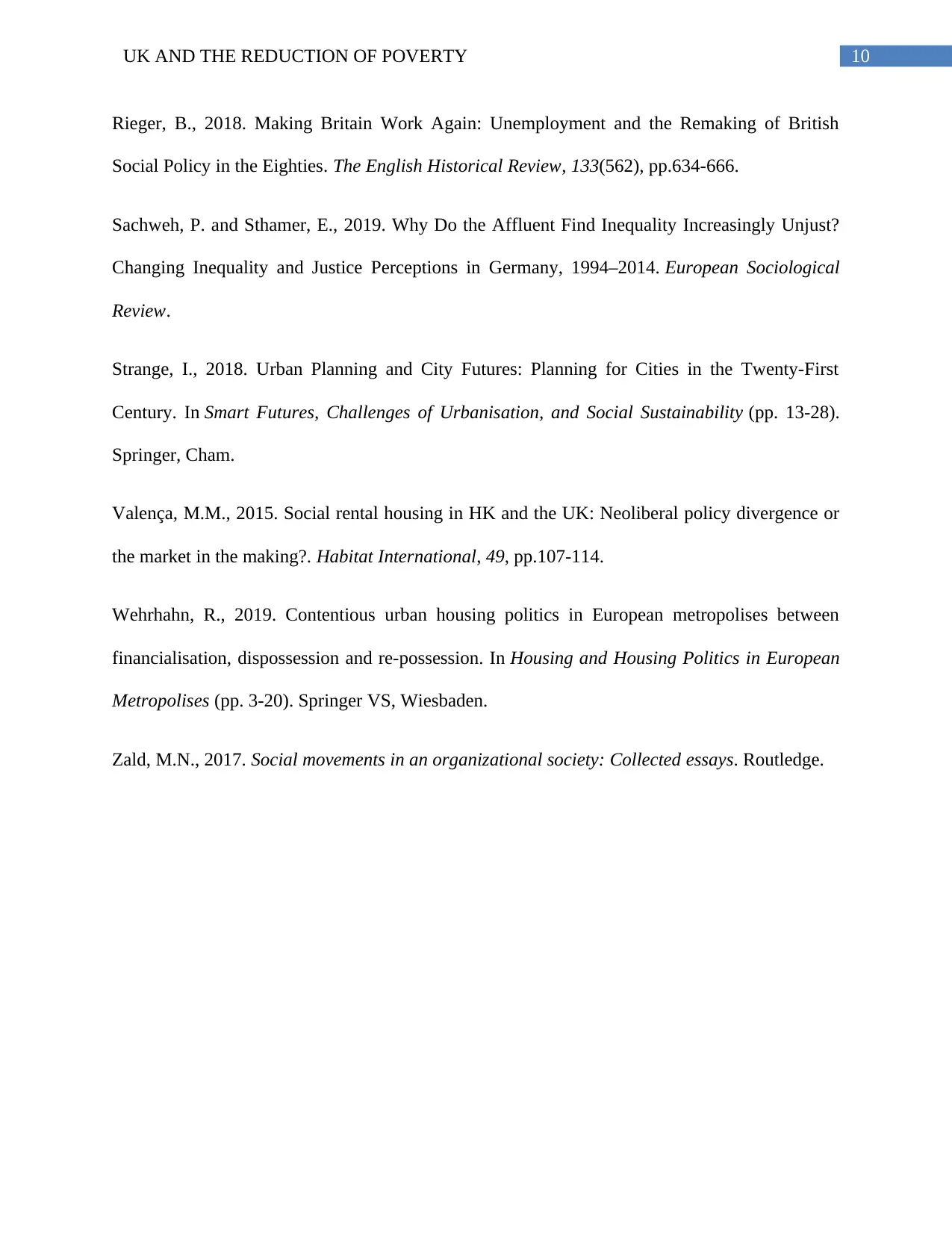
10UK AND THE REDUCTION OF POVERTY
Rieger, B., 2018. Making Britain Work Again: Unemployment and the Remaking of British
Social Policy in the Eighties. The English Historical Review, 133(562), pp.634-666.
Sachweh, P. and Sthamer, E., 2019. Why Do the Affluent Find Inequality Increasingly Unjust?
Changing Inequality and Justice Perceptions in Germany, 1994–2014. European Sociological
Review.
Strange, I., 2018. Urban Planning and City Futures: Planning for Cities in the Twenty-First
Century. In Smart Futures, Challenges of Urbanisation, and Social Sustainability (pp. 13-28).
Springer, Cham.
Valença, M.M., 2015. Social rental housing in HK and the UK: Neoliberal policy divergence or
the market in the making?. Habitat International, 49, pp.107-114.
Wehrhahn, R., 2019. Contentious urban housing politics in European metropolises between
financialisation, dispossession and re-possession. In Housing and Housing Politics in European
Metropolises (pp. 3-20). Springer VS, Wiesbaden.
Zald, M.N., 2017. Social movements in an organizational society: Collected essays. Routledge.
Rieger, B., 2018. Making Britain Work Again: Unemployment and the Remaking of British
Social Policy in the Eighties. The English Historical Review, 133(562), pp.634-666.
Sachweh, P. and Sthamer, E., 2019. Why Do the Affluent Find Inequality Increasingly Unjust?
Changing Inequality and Justice Perceptions in Germany, 1994–2014. European Sociological
Review.
Strange, I., 2018. Urban Planning and City Futures: Planning for Cities in the Twenty-First
Century. In Smart Futures, Challenges of Urbanisation, and Social Sustainability (pp. 13-28).
Springer, Cham.
Valença, M.M., 2015. Social rental housing in HK and the UK: Neoliberal policy divergence or
the market in the making?. Habitat International, 49, pp.107-114.
Wehrhahn, R., 2019. Contentious urban housing politics in European metropolises between
financialisation, dispossession and re-possession. In Housing and Housing Politics in European
Metropolises (pp. 3-20). Springer VS, Wiesbaden.
Zald, M.N., 2017. Social movements in an organizational society: Collected essays. Routledge.
1 out of 11
Related Documents
Your All-in-One AI-Powered Toolkit for Academic Success.
+13062052269
info@desklib.com
Available 24*7 on WhatsApp / Email
![[object Object]](/_next/static/media/star-bottom.7253800d.svg)
Unlock your academic potential
Copyright © 2020–2025 A2Z Services. All Rights Reserved. Developed and managed by ZUCOL.





